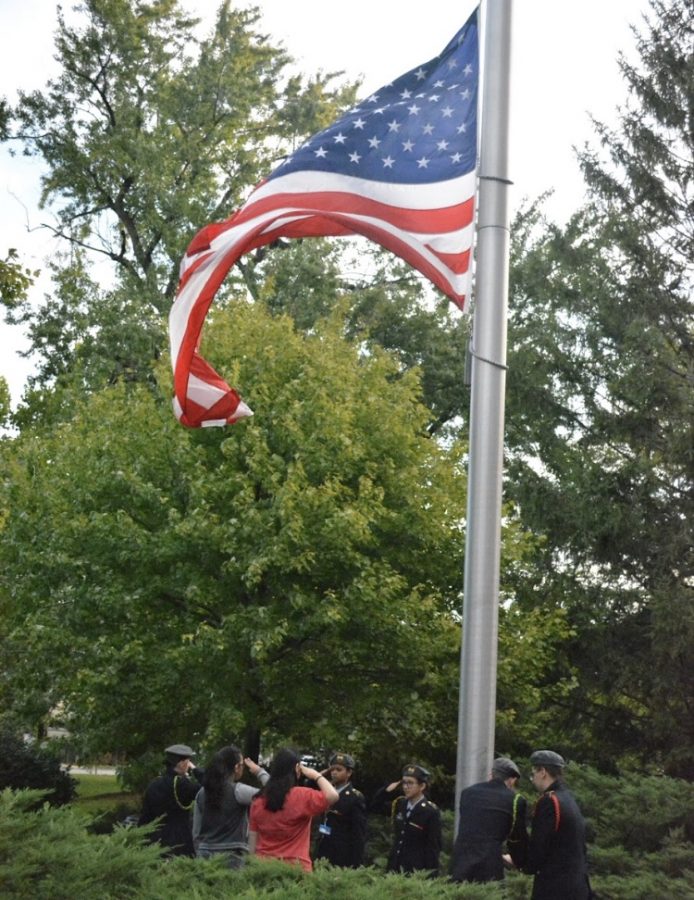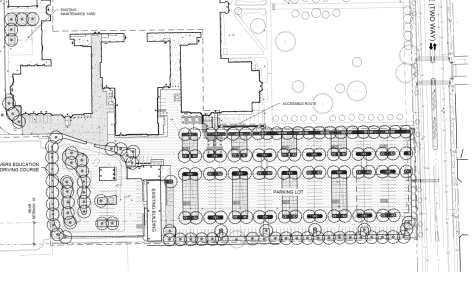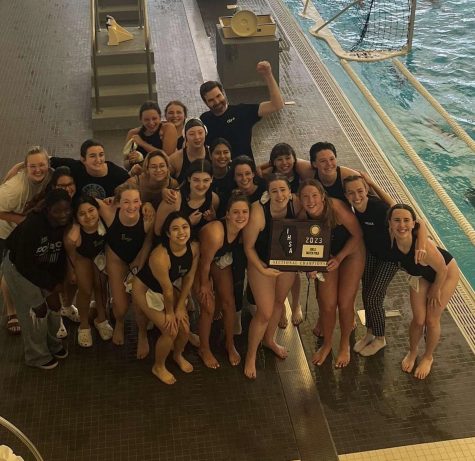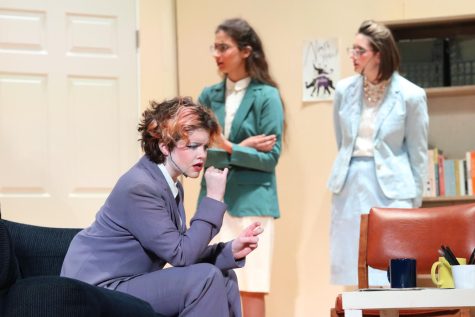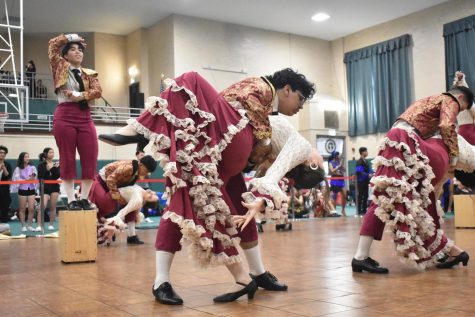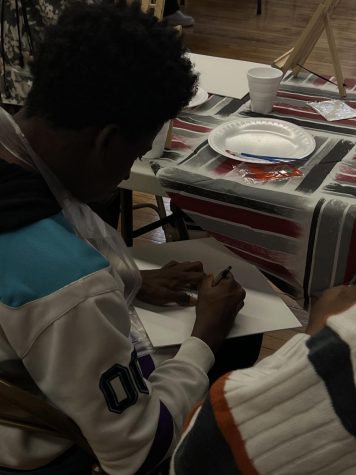To stand or not to stand: Controversy over morning anthem
JROTC students raise the American flag before first period.
October 19, 2018
Over the course of a Lane student’s high school career, one may become accustomed to a certain routine. Each morning before class, the national anthem blares over the PA system, signaling a momentary pause in all activities and the commencement of the day.
It was always assumed that all people in the school should freeze in their places when the national anthem was played. It was expected that their bodies should remain angled toward the direction of the nearest flag for the duration of the song, their voices silent and their hats taken off as a sign of respect. Shouts from security guards and teachers echoed down hallways for those who attempted to sneakily walk to their classes while the anthem played.
For many years, this was not questioned. It was simply recognized as a hallmark American tradition.
In recent years, however, this notion has been increasingly challenged not only at Lane but throughout the United States. A national protest in response to the national anthem began on Aug. 14, 2016, when former San Francisco 49ers quarterback Colin Kaepernick decided to take a knee during the national anthem in response to the issue of rampant police brutality in America.
The act of resistance gained national media attention, which spurred a myriad of other NFL players to join Kaepernick in his protest by taking a knee before their respective games.
Such actions received immense backlash from the Trump administration, which in turn enabled NFL owners to enact a new policy on May 16, 2018, allowing individual teams to discipline players for protesting the national anthem before games. In many cases, taking a knee during the anthem is punishable by a fine.
At Lane, many students chose to participate in the resistance by sitting down during the anthem or refusing to stop walking in the hallways while it was played.
“I sat every day for the anthem, whether I was in class or in the hall. I’ve been called many names for not supporting the anthem, supporting the Black Lives Matter movement and Colin Kaepernick,” Jaden Kuykendahl, Div. 957, said. “I sit because my ancestors went through a lot just to be acknowledged.”
As students increasingly showed their support for the movement, small conflicts arose between administration and students. While students were allowed to protest the anthem, it became unclear whether teachers were allowed to stop students from walking in the hallway during this time.
According to JROTC instructor Col. (Ret.) Cogdall, the students, as well as staff, must learn to adapt to such situations as they are new to everyone.
“It was the confusion between not only students but the faculty as well,” Cogdall said. “What are students required to do? What are faculty members required to do? I think that’s an education process; I don’t think we’ve done that yet.”
Thus, Lane’s administration decided to temporarily stop playing the national anthem for the final weeks of the 2017-2018 school year.
According to retired teacher and alum Mr. Keating, the national anthem was played daily at Lane since 1964, making it at least a 54-year tradition until it stopped this year.
Hanly said that the confusion between teachers and students in the hallway was one of the main reasons why administration decided to enact the change.
“I think it was one thing when kids were in class and they were purposely choosing to sit, but the hallway was really becoming the issue,” said Assistant Principal Ms. Hanly. “Kids weren’t listening to adults, and we were trying to decide—if this isn’t important to our student population, then is this something that we need to continue to do?”
In the midst of what was dubbed a “tactical pause” by Principal Mr. Tennison, Hanly said that administration opted instead to begin each morning with a daily organizational quote which would correspond to the Advisory theme of the month.
“Mr. Tennison believes that the purpose of the national anthem being played in the morning was really just to unify the school to start the day,” Hanly said. “And we thought that rather than having something so politically volatile for everybody, we would do something that could just unite us as a school, which would be an overarching quote.”
The daily organizational quotes carried on to the current 2018-2019 school year as administration discussed plans to address the issue. The final plan was to create a survey which would gauge the general consensus of the student population.
On Sept. 26, administration sent out a survey via email which asked students whether they would prefer the anthem to play every morning (either 8 a.m. or before then), only at sporting events, assemblies and commemorative events or only at the start of each week.
According to Student Special Service Advocate Ms. Escobar, the survey was open from Sept. 26 during advisory until the end of the day on Sept. 28. It was taken by 2,765 individuals, and students who voted multiple times were only counted once.
The results were announced within two days later. According to the email, 55.9 percent of the survey respondents voted not to play the national anthem and to continue with the morning quotes, while 44.1 percent of the survey respondents voted to play the national anthem in the morning.
When asked when the anthem should be played, 34 percent voted only during assemblies and sporting events, 31.3 percent of the survey respondents voted only on commemorative dates, and 10.8 percent voted only at the beginning of the week (Monday or Tuesday, if there is a holiday on Monday).
Due to the results, the national anthem will no longer play in the morning, only during sporting events and assemblies.
Hanly said she believes that playing the anthem exclusively during sporting events and assemblies will allow the song to hold more meaning, rather than just being viewed as a daily routine.
“To me, it’s losing its purpose in the building,” Hanly said. “Whereas when we use it at an assembly, or we do it at a sporting event, or it’s unifying the group in some way, then it becomes at least a little bit more powerful. And again, that’s not saying then that students still don’t have a right to protest by choosing to sit.”
Anthony Malo, Div. 990, said that the national anthem being played in the morning is a sacred and unifying tradition that should not be restricted to just sports games and assemblies.
“It [the national anthem] really isn’t a thing that needs to be made ‘special,’” Malo said. “It’s a national song, and it carries its own worth. It being a daily routine shows that despite all things, we’re all united as Americans.”
Lane is not the only school that does not play the national anthem, Hanly said.
In fact, the national anthem does not play daily at many CPS high schools, including Von Steuben and Northside Prep. At Lincoln Park, Whitney Young, Walter Payton, Taft, Amundsen, and Jones, the anthem is only played during sporting events and assemblies.
As with most changes to policy, a great deal of controversy surrounds the issue among the Lane community. In addition, some students argued that the survey was not done fairly because it was only open for two days.
“The national anthem being discontinued is a disappointment; it represents everything soldiers fight and die for,” Malo said. “It’s unfortunate that Lane made this a political statement. It’s a song that unites all Americans and should be played every morning. The survey was done poorly.”
Bernard Ucol, Div. 990, offered a contrasting opinion, explaining that playing the national anthem daily causes too much conflict between students on opposing sides.
“I support a discontinuation of the national anthem in the morning. I respect other people’s ways of observing the significance of the anthem and the American flag —people serving for our right to observe how we want,” Ucol said. “But playing it out loud in an environment of people figuring out how to observe it inherently brings them to clash if they observe differently.”
Aster Smith, Div. 985, also expressed her support for the discontinuation of the anthem in the morning.
“I agree with the discontinuation for a myriad of reasons, but the most central of it all is being what it stands for,” Smith said. “So many people went around claiming, ‘We should have the anthem played to honor our country,’ but has anyone really sat down to think about what they’re honoring? You’re honoring a country with extremely anti-black roots which continue to be perpetuated through the song and in modern day. You’re honoring a country where terrorizing black folks is basically legal if you have a certain occupation. I know for a lot of the black population at Lane—not all, but a large portion—there’s the feeling where we have to listen to this song that doesn’t have anything to do with us besides terrorizing us.”
Jesus Jimenez, Div. 963, said that the anthem should be played daily and views the discontinuation as a sign of disrespect towards American soldiers.
“Genuinely, I am disappointed as well as angry,” Jimenez said. “The fact that people won’t respect the anthem as well as those who gave their lives to let us be where we are right now is very disheartening.”
In regards to the controversy, Hanly noted the difficulty of being able to find a compromise between all students while attempting to make all feel comfortable and welcomed in school.
“We want it to be impactful for people; we want to start the day in a unified way in some way,” Hanly said. “It is a divided idea for our student population, but Lane represents all of its students. Not just some.”

